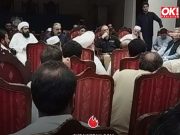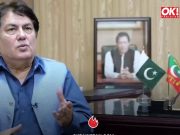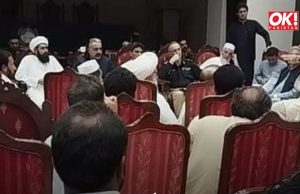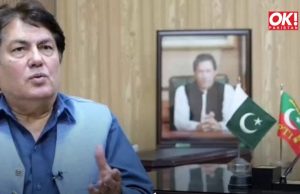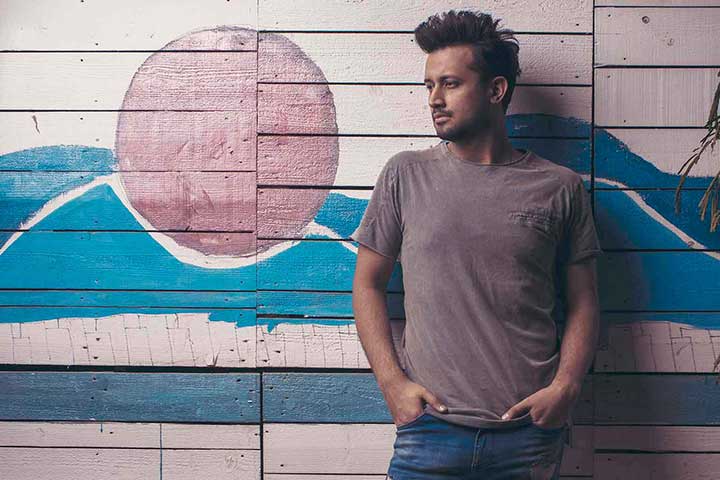
“If there was any mantra or philosophy that could guarantee success, everyone would be a hit”
A few years ago, a young man with a dream, a guitar in his hand and melodious voice set out to conquer the world, and so he did. Atif Aslam, who has remained a music sensation year after year and the man behind many Bollywood blockbuster film tracks, started his journey to success when he was barely 21 years old. Since his chart-topping track Aadat, which made Atif Aslam a household name, there has been no looking back. What began as a hobby (singing in public during his days at PICS, college and various restaurants) ultimately turned into a passion, and before he knew it, he was the lead singer in a band called Jal formed by himself and guitarist Gohar Mumtaz. However, an interesting fact is that Aslam’s first love wasn’t music – it was cricket; the fast bowler dreamt of representing his national team and was in fact training to participate in the U-19 World Cup.
After performing worldwide, rocking the stage at every concert and winning the hearts of millions, Atif Aslam has set the benchmark for all upcoming singers rather high. Making Pakistan proud through all his heartwarming songs, professional decorum and leaving every music lover a hopeless romantic just waiting to hear his next big hit, the musician has not only proven himself on the singing front but also on the acting front. While he admits that acting isn’t his forte, he was seen in Pakistan’s first groundbreaking production Bol that addressed a very taboo social topic.
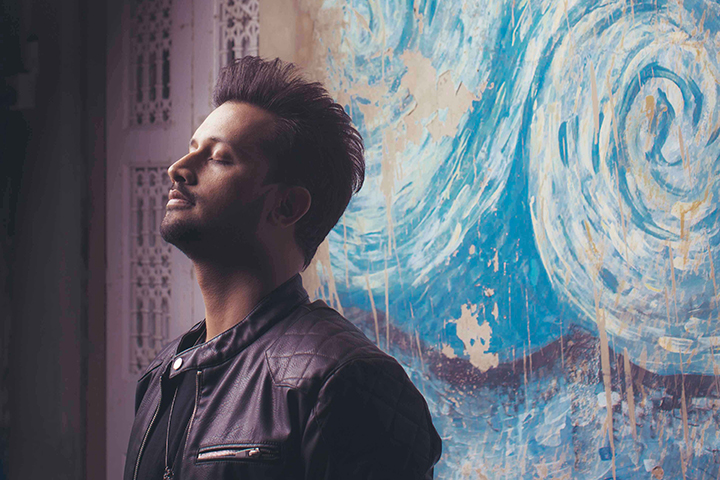
His voice has been featured in countless Bollywood films; Aslam’s work in Race was nominated for a Filmfare Award along with four other songs from his second album Doorie (featured in two films). Yakeen, Ehsaas and Aadat from his first album Jal Pari, featured in the 2005 film Man Push Cart won international awards and was praised by critics. Doorie and Maula were selected in 2010 for the soundtrack of the Spanish Beauty, the Hindi version of the 2005 Mexican film La Mujer De Mi Hermano directed by Ricardo de Montreuil. He then sang two songs Bol Ke Lab Azaad Hain and Mori Araj Suno in Mira Nair’s 2012 film, The Reluctant Fundamentalist.
Here, the star talks to us about how it all began, his dreams and inspirations plus lots more.
Where did it all begin? Did you always dream of becoming a singer?
Atif Aslam: Actually I wanted to become a cricketer but that passion didn’t go too far since my family wasn’t in favour of it. However, I used to love participating in family antaakshari sessions and college competitions, and win them. So to be honest I didn’t even know you could produce your own song; like if I saw Salman Khan in a movie my thoughts were that he is the main singer and he has composed it and done everything. [Laughs] I had no concept of musicians, music directors and the whole process involved in the playback. I didn’t even know I would become Atif Aslam one fine day. I had never dreamt of becoming this big and I consider myself truly blessed.
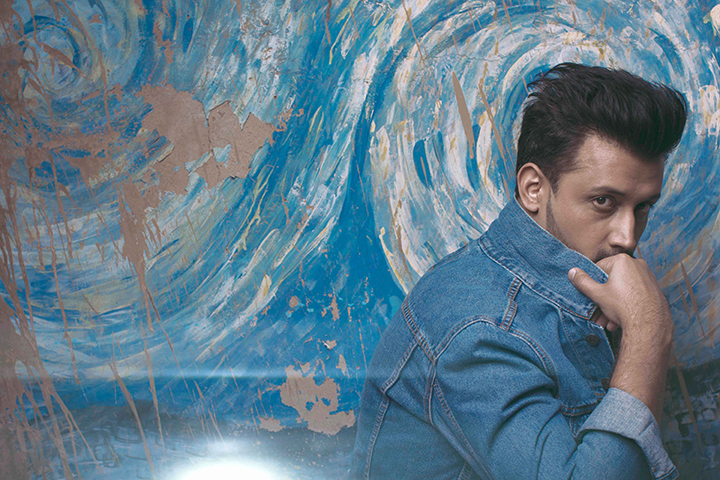
Rumour has it, you were actually training to represent the country in the U-19 World Cup owing to your love for cricket. What ever happened to your passion for the sport? AA: Yes, I always wanted to be a fast bowler and actually got selected for the under-19 cricket team but my parents didn’t let me go ahead with my plans because they wanted me to be a doctor.
Your first single Aadat went viral and took the Pakistani audience by storm. What was your reaction to the immense appreciation and fan love you received?
AA: Well I had no idea it was going to do that well. I just thought that Aadat would be this one hit wonder and then I recorded my first album and put it on the Internet to which I got a fantastic feedback from the audience. When Aadat went viral, I received quotes from people saying that they didn’t know who the singer was and they were assuming I was some 56-year-old man and were surprised to know I was quite young – at that time I was just 21 so they were surprised to hear such a heavy voice. Apart from that what I heard a lot was that Aadat was a rip-off that I bought from Italy for six hundred thousand rupees. That was hilarious and the most ridiculous rumour I have ever heard. [Laughs] I didn’t think Aadat was going to become this cult song because back then I used to listen to Junoon and all of a sudden this guy comes (me) out of nowhere and becomes a rage. It was very overwhelming and at that time I didn’t realise the burden that came along with becoming a celebrity. But yes, at that time when people started appreciating me, I was getting fame and attention from all the girls, I said game on!
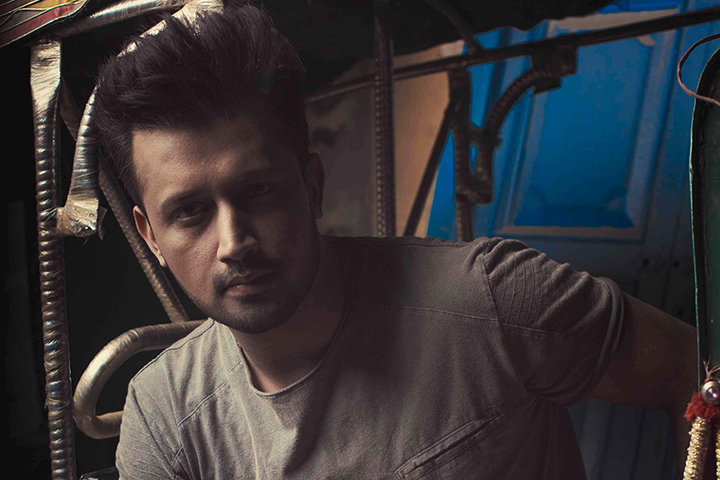
You started out as being the lead singer of Jal but soon parted ways and launched your solo career. Would you like to elaborate as to why you chose to split with Gohar?
AA: One of the best things that has happened to me was the break-up of my band. Firstly he wanted to become the lead singer. Second, he wanted a greater share out of the financial chunk, which I was alright with up until one day he suggested that his brother would manage the band although my brother Shabaz was already doing that to which I just had to say, “Band may musicians rakhain gein, ya managers? Take it easy!” [Laughs] Also there was one primary reason for the split up. After our little tiff, I received a query and I said to him let’s just forget everything and play together. There was a gig coming up; and two days before the show he told me that he had gotten a query for a television show on the same date and it will be more beneficial for the band so why don’t we just go there and perform instead. I told him I couldn’t do that because I had received all the advances and that would just be unethical to back out last minute. So he said okay sure go ahead and do what you like and I’ll be attending the show and will represent Jal there. To everyone’s surprise when he went there the host started asking for the singer and obviously he couldn’t sing Aadat at that point and said he would call me. On the phone he faked a whole conversation with me in front of the team and pretended someone had died at my place due to which I couldn’t make it to the show and that he would handle everything on my behalf. The team couldn’t believe it and I got a call from Ahmed Ali Butt that very night and he asked me “Are you Atif Aslam?” and I said ‘yes’ and he asked me to prove it to him by singing to him and I laughed at first but back then, this was 12 years ago, I was happy to do it. Once he heard me sing he was convinced I was the real deal. After that call they took Gohar’s tickets back and didn’t allow him to perform!
Did you think Jal Pari would be so successful after Jal breaking up? What was the inspiration behind such a great album?
AA: Once again I didn’t know Jal Pari was going to be that big of a hit. It stayed there as the number one album for about three to four years and I recorded my gut; I got inspired by my college friends, this girl that I was going out with at the time, and I wrote that song about her, and whenever I listen to it till today everything feels just as fresh as it was. I have had great memories with it and yeah it’s purely love! In terms of inspiration I think whatever I was going through in my life was a bit tough – I was a loner and I was not very expressive which till date I’m not but music was one art form where I was able to express myself and tell people how much I love them. Songs such as Bheegi Yaadein and Yaqeen were all about friendship and love whereas Ehsaas was all about self-construction. I have always had this spiritual connection; whenever I sit and write music, it comes to me very naturally.
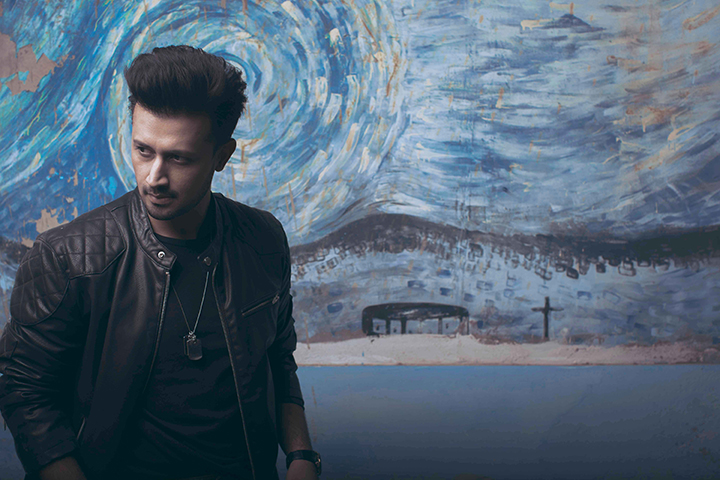
Most of your songs (Bheegi Yaadein, Ehsaan, Mahi Ve, Ankhon Sey and Jal Pari) have gone on to become major hits across the subcontinent. How does that make you feel?
AA: After the first album I was said to myself, OK fine, we have spent two and a half/three years, we’re doing gigs, we’re performing everywhere but what’s next? One fine day I received a call from Mahesh Bhatt and he wanted my song Woh Lamhey for his film Zeher and I was like whoa! So I said alright, fine so I guess my album has had an impact. I got invited to Bombay and we recorded the whole song but to my surprise I wasn’t really happy with it because I had to change the lyrics and melody of the song which was completely different to my original songs. Changing the whole song and the lyrics wasn’t a great experience. However, recording over there and getting introduced to the playback industries was the finest thing to have happened to me. I mean that’s how it all started in Bollywood and I have Mahesh Bhatt to thank for that.
Describe the teenage Atif Aslam.
AA: I belong to a middle class family and I used to travel by local vans. Atif Aslam as a teenager was a happy, positive, adventurous, spiritually powerful, naive person who had no fashion sense. His friends were his strength. Some of my fans from Kashmir actually kept a Quran Khani for the success of my second song and the first album, which I had no idea how to respond to back in the day. Now that I think about it, it was out of sheer love!
What is your relationship like with your parents? How happy was your father with your decision to become a singer? Is he a strict father?
AA: My relationship with my parents is really good actually. Mostly I’m on tours but when I’m back I try to spend time with them and I believe that it’s their prayers that are behind my success. You know I have never seen a more dedicated individual in my whole life than my father. He used to be a government officer but now he’s retired. He loves to keep himself busy and Alhamdulillah he’s a very healthy and happy man, and I have learnt a lot from him. My parents didn’t actually get to know about my singing because I literally just recorded the song and put it up on the Internet. They found out through my neighbours one fine day, two years after the release of Aadat. They said to my father, “Your son is a singer? He has a great voice.” And my father responded “No he isn’t, you are mistaken.” He then found out it was my voice and initially, he didn’t appreciate it much. He just thought it’s a hobby and all about my fans and all for me; he had no idea it would become a profession for me. To be honest, neither did I! But thankfully, now it is my profession and they have accepted it. But of course they are my parents so at the end of the day it comes down to ‘Ghar ki Murgi Daal Barabar’. [Laughs]
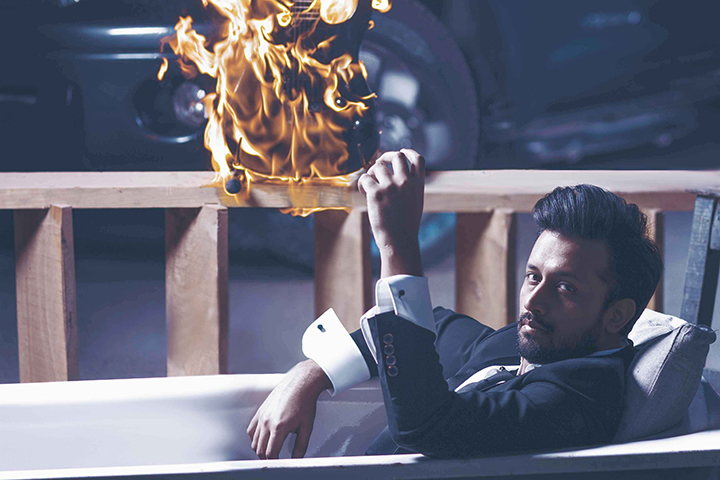
What would you say is your success mantra/philosophy?
AA: I don’t think there’s any mantra or philosophy behind the success of my Bollywood songs or the music for that matter. I think it’s just that I’m purely blessed because there are far more talented singers out there; it’s just that I have been very lucky throughout. To be honest if there really was any mantra or philosophy that could guarantee success, everyone would be a hit.
How was your acting experience in Bol? Did you enjoy working with Mahirah Khan?
AA: Indeed, the acting experience was challenging. It was interesting because you have to be so absorbed in the character and that’s very different from a music video. I remember sitting in the director’s office while he was discussing the female lead and in those days Mahirah happened to be a VJ and I had referred her name to Shoaib saab. I felt she would be a better lead so I suggested her name. And yes, it was definitely fun; it was great. Mahirah as a co-star, has really evolved and come a long way now. Not only has she done drama series but also more films at the same time. So, she is a more empowered Mahirah today.
Do you enjoy your celebrity star status?
AA: I don’t think I have ever actually enjoyed my celebrity star status. I’m still trying to understand what exactly is a celebrity star status. I think personally it comes with great responsibility and just getting wasted isn’t all about that status at all. It’s about helping people, entertaining them, and putting a smile on their faces. It’s about appreciating the poor more as compared to the rich and there are so many elements involved. I mean I still like to stand in the lines and wait for my turn at the immigration. However, if someone’s nice and wants to give me any kind of protocol, I don’t say no to them but then again I don’t ask or call for it. That isn’t exactly called having a celebrity star status. I enjoy being Atif Aslam.
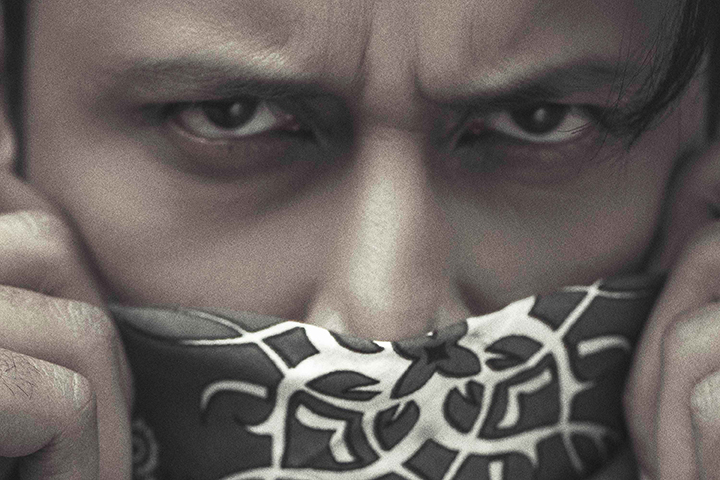
Would acting be something you would consider making your main profession? Have you been offered any interesting projects?
AA: I don’t think acting could ever be my main profession because I love music. I live for music and I believe I was born to be a musician.
How does it feel to be recognised as one of Pakistan’s most loved pop singers and musical icons and receive so much love from fans all across the world? Does it get overwhelming?
AA: I feel great – the love I receive from fans, the way they respond to me, how they sing my songs plus the adrenaline rush at gigs is amazing. It gives me a lot of life and hope for the music industry as well. It’s brilliant how a pop singer sings a Qawalli and that becomes the biggest thing. Once again it’s the sheer love of my fans along with the prayers of my parents that have gotten me where I am. Indeed I’m blessed and it’s very overwhelming. Especially when you see people from Burma, Bhutan, Surinam, Africa, Nairobi and Trinidad – when people from places like these appreciate your music is when you feel like music has so much power.
Where do you continue to find inspiration for your music? AA: My inspiration comes from people. When I have a conversation with strangers, when I hear reviews about anything from an old man, when I see a child smiling, the way my fans react to my music, when I think back on the way I have treated my ex-girlfriends and how they have loved me. So the inspiration could be from anything. From the musicians like Jeff Buckley, and Hootie & the Blowfish, from whom I hear all sorts of genres, I seek a lot of inspiration.
What would you say differentiates your music from others?AA: I don’t know what differentiates my music from others but I suppose the subjects that I choose to address in my songs and the melodies but most of all, when I conceive a song, it’s that moment when I know whether it’s going to make it big or not.
How do you manage your very busy professional life and family simultaneously?
AA: I think I have been very blessed that way. I’m very thankful to my wife Sara for understanding my professional life. It’s not easy to be away from your companion but these American tours really take up a lot of energy and time. Most of the time, I try to take her along with me.
Do you consider yourself a Pakistani musical icon/superstar?
AA: I think I’m too small to be called a musical icon or even a superstar. I don’t know what the definition of a superstar is and I have never believed in there being something like ‘number one’. I used to think about being that at one point in my life and I was rather ambitious to get there but now I don’t think there is any such benchmark as a number one.
What are your comments on the recent hostility shown towards Pakistani celebrities by certain sects in the Indian community? Is it fair to turn back the rising Pakistani talent and the actors, musicians etc after all their contributions to Bollywood?
AA: In my case, things have been very different. My album became a rage in Pakistan first and then I was approached by India. However in most cases it’s the complete opposite. I remember people used to listen to Nusrat Fateh Ali Khan saab; it was when his song was featured in an Indian film that he gained popularity and people started recognising him for his talent, which is sad because he is the biggest legend that we have ever produced.
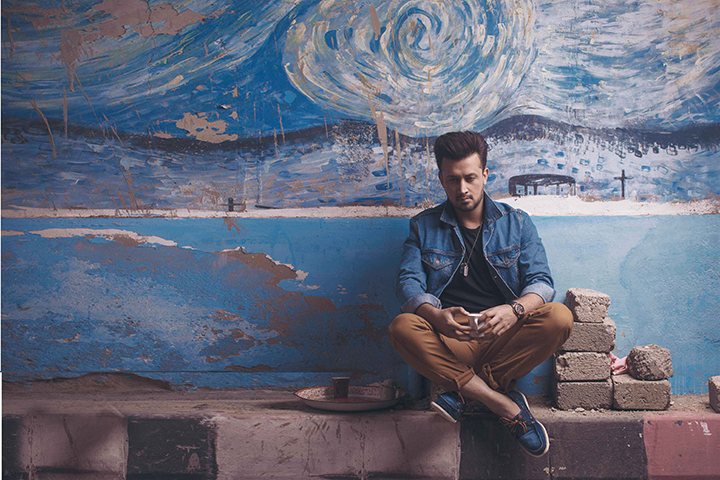
What is the biggest disadvantage of your celebrity status and why?
AA: I can’t walk on the streets freely, I can’t have chai at the dhaabas, I can’t feel like a normal person at the airports, I barely have any privacy, I sometimes have to entertain people even when I don’t want to, I have to take selfies even when I look horrible – basically I have to deal with a lot of stuff. [Laughs]
A married man, father and super successful; what’s next for you Atif Aslam? Anything left to accomplish?
AA: There’s one thing I would like to accomplish – I want people to learn how to achieve happiness so I can stay happy myself.
How does your family handle your success?
AA: Well my family enjoys and celebrates my success most of the time. What I love the most is that they are the ones who keep me grounded. My family keeps me down to earth and humble, and I can never thank Sara enough for that.
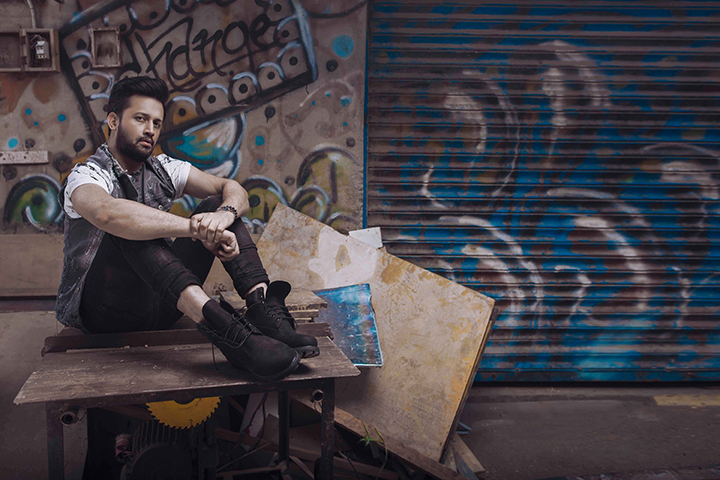
Tell us something about the person Atif Aslam not the celebrity Atif Aslam.
AA: I think Atif Aslam the person is very ordinary. He believes in the fact that if you give respect, you get respect. He’s a rather simple guy but at times when needed, he can be the celebrity Atif Aslam!
INTERVIEW: FIZZA FURQAN
COORDINATION, CONCEPT AND STYLING: FIZZA FURQAN
PHOTOGRAPHS: ABDULLAH HARIS
LOCATION: COMMUNE ARTIST COLONY
HAIR AND GROOMING: SAJID’S






